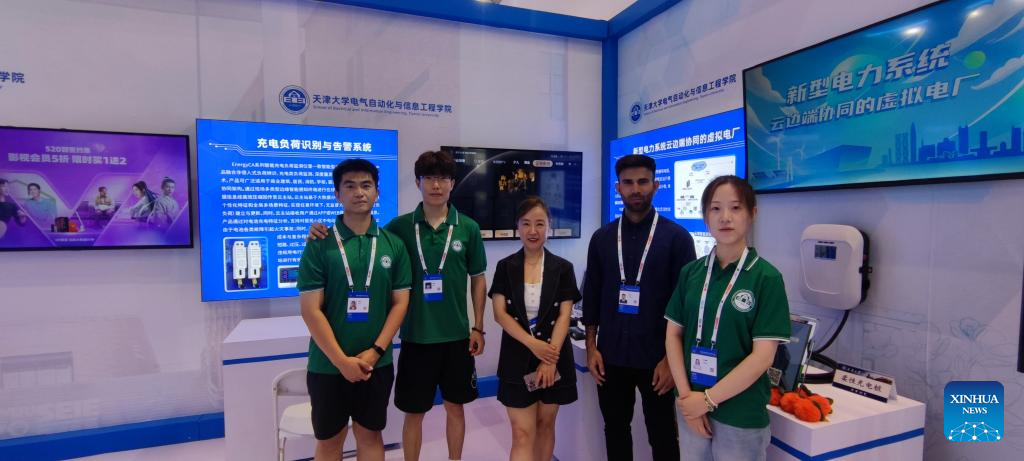Feature: From Pakistani village to Chinese lab: a scholar's quest to light up homes with AI technology
Source: Xinhua
Editor: huaxia
2025-09-13 22:47:30

Muhammad Sarfraz (2nd R), a Pakistani doctoral student at Tianjin University, poses for a photo at the World Intelligence Expo 2024 in north China's Tianjin, June 20, 2024. (Xinhua)
TIANJIN, Sept. 13 (Xinhua) -- Muhammad Sarfraz, a Pakistani doctoral student at Tianjin University in north China's Tianjin Municipality, debugged artificial intelligence (AI) algorithms and developed a real-time AI-powered simulation system for integrated energy systems, aiming to optimize the stability of smart urban energy grids.
Growing up in the remote village of Dera Ghazi Khan in southern Punjab, Pakistan, Sarfraz faced frequent power outages due to floods and heavy winds.
"From an early age, I was curious about the world beyond my hometown and fascinated by how technology could improve everyday life," he recalled. "I often wondered if there was a more affordable and convenient solution to provide consistent power to these remote communities."
Driven by this curiosity, Sarfraz pursued higher education and research opportunities in China over the past decade. Now, as a PhD candidate at Tianjin University's School of Electrical and Information Engineering, he focuses on AI-driven innovations in renewable energy storage systems.
Sarfraz's academic journey began in Pakistan, where he earned a bachelor's degree in electrical engineering from Sukkur Institute of Business Administration University in 2016.
Eager to apply his skills, he spent two years working for a government department in Lahore. "This work was valuable," he says, "but it did not fully satisfy my desire to deepen my technical skills and gain advanced knowledge related to my field of interest."
Turning to China, he completed a master's degree in electrical and automation engineering at North China Electric Power University in Beijing. There, he researched renewable energy forecasting, discovering the potential of AI.
"AI is revolutionizing how energy systems are integrated, planned and controlled, enabling predictive insights such as estimating remaining useful life, which relates to my work on battery health assessment," he explained.
This led him to Tianjin University for his doctorate, drawn by its academic excellence, supportive environment for international students, strong career prospects, and global recognition in research and development. "Its forward-looking research culture and focus on cutting-edge technologies make it an ideal place for innovation and personal growth," he said.
Sarfraz's routine includes lab work on simulations, AI model training, and battery data analysis for AI applications in energy systems, specifically the prediction and optimization of renewable energy storage in urban systems.
Having studied in Tianjin for three years, Sarfraz fondly refers to the city as his "second hometown." Beyond his studies, he enjoys wandering the streets of Tianjin.
"Tianjin, to me, is a city of beautiful contrasts. It's where history and modernity shake hands. On one street, you can be surrounded by stunning European-style architecture that tells stories of the past, and just around the corner, you will find cutting-edge innovation, skyscrapers, and a fast-paced modern life."
"This blend of tradition and modernity has given me much inspiration for my research," he said, adding that the scenery fuels his creativity, reminding him how diverse perspectives can spark innovation.
On the shore of the Bohai Sea, world leaders gathered in Tianjin from Aug. 31 to Sept. 1 for the Shanghai Cooperation Organization (SCO) summit.
"We will see the SCO Summit act as a powerful catalyst for deeper collaboration, not just in politics and economics, but especially in areas like AI technology, clean energy, education, and cultural exchange."
"As a researcher, I'm particularly excited about the potential for new scientific partnerships and talent exchange programs that could emerge. This summit is a brilliant opportunity to build bridges," he said.
Looking ahead, Sarfraz plans to continue in academia and research, focusing on sustainable energy systems and battery technologies. He hopes to bring AI-driven solutions back to Pakistan, illuminating those remote villages with efficient technologies that first sparked his curiosity. ■



